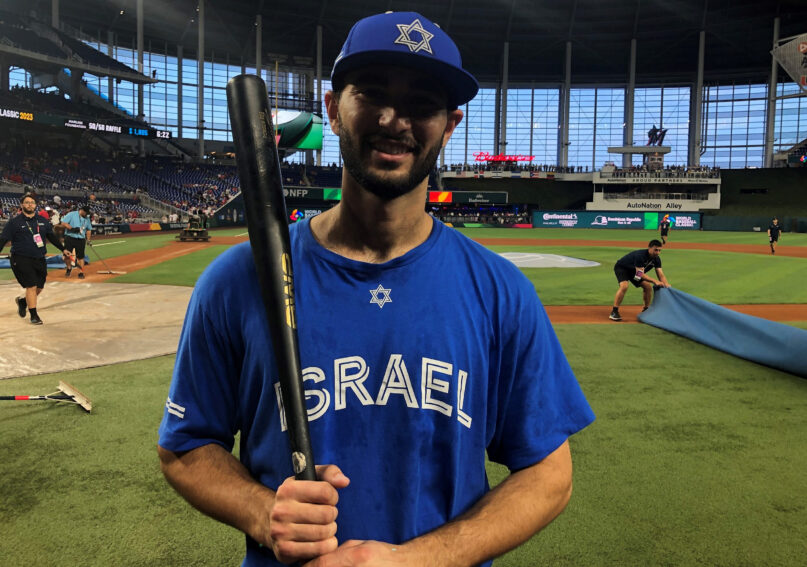
By Howard Blas
(JNS) After 21-year-old Nicaraguan pitcher Duque Hebbert struck out three of the four batters he faced—all-stars Juan Soto, Julio Rodríguez and Rafael Devers—at the World Baseball Classic in Miami, a Detroit Tigers scout offered him a Minor League contract on the spot. But for most players, including most of Team Israel’s roster, who may never reach the big leagues, the World Baseball Classic could be the largest crowd before which they will ever play.
When JNS caught up with Michael Wielansky, 26, ahead of Israel’s blowout loss on March 14 and asked what will be next for him after the competition, Team Israel’s shortstop, who lives in St. Louis, allowed that was a good question.
“I hope I’ll get a call from an [MLB] affiliate, or I’ll play independent ball,” he said. The latter refers to a league that is outside the Major League Baseball-run Minor Leagues.
One possibility is finishing up his last year of a bachelor’s degree in business and economics at the College of Wooster in Ohio.
“The whole journey is really crazy,” Steve Wielansky, the player’s father, told JNS.
Growing up in St. Louis, Wielansky celebrated his bar mitzvah and confirmation at Temple Israel. “My parents did a good job instilling a love of Judaism in me,” he said. “I learned a lot about Judaism.”
Steve and Linda Wielansky reported that their son was a good athlete who played soccer and basketball, as well as baseball. It was difficult to juggle sports and Hebrew school, but the family made it work.
For Wielansky, who stood 4-foot-9 inches at his bar mitzvah, professional sports seemed a remote possibility. He was only 5 feet tall when he entered high school but 6 feet by his graduation—and he did not stop there. Today, Wielansky stands at 6 feet 2 inches.
“He was a great hitter and fielder, but he couldn’t get recruited,” his father said.
After graduating from Ladue Horton Watkins High School in St. Louis, Wielansky attended College of Wooster in Ohio, where he hit .425 and won a gold glove award for his stellar defense at shortstop on the baseball team. The summer after his sophomore year in 2017, he was the most valuable player at the prestigious Valley Baseball League collegiate program, where he topped the league in on-base and slugging percentages, hits, runs and doubles.
In 2018, Wielansky hit .401 and broke Wooster’s career records for assists and triples. He was named a first-team all-American and, in both 2017 and 2018, a Mideast Region position player of the year. In the latter year, scouts started paying attention, including his hometown St. Louis Cardinals.
The Houston Astros drafted Wielansky as the 552nd overall pick, which came in the 18th round in 2018. He was a junior.
When her son was drafted, Linda said their rabbi lost a joke from his repertoire when he nudged students to exert themselves in their studies.
The rabbi told her that Wielansky’s draft really messed things up for him. She asked why. “I always tell the kids, ‘It’s not like you’re going to be a professional athlete or anything,’ ” he said. “Now I can’t say that anymore.”
Wielansky’s paternal grandfather, Norman, pitched in the St. Louis Browns and Baltimore Orioles organizations in 1950, 1951 and 1954. Norman Wielansky, a right-hander, was part of a combined no-hitter on May 3, 1950. He was especially proud of his grandson but didn’t get to see Wielansky in his recent performance in Miami. He died at the age 88 in 2019.
“My father and grandfather were my role models,” said Wielansky. “They got me into baseball.”
Norman Wielansky was 6 foot 3 inches and 200 pounds, while his grandson currently weighs in at 190. The Astros wanted him to be 210, said his father, Steve. Wielansky bounced around the Astros organization for several years, playing for the Minor League teams Tri-City Valleycats, Quad Cities River Bandits, Fayetteville Woodpeckers, Corpus Christi Hooks, Sugar Land Skeeters and Sugar Land Space Cowboys.
The Astros elevated Wielansky to triple-A in 2021 but released him on March 27, 2022. “They didn’t have room for him,” said his father, Steve. Wielansky signed with the Long Island Ducks that April. But he didn’t play for that independent league team, and in May, he was traded to the Southern Maryland Blue Crabs.
In January 2023, Wielansky’s career found him in Panama and as part of the Caribbean World Series. In February, he learned he would play for Israel in the World Baseball Classic. Wielansky found a lot of success in the Panamanian league, which his team won and where he hit .347.
Representing Israel, whose team “instills a culture,” in March was a great experience for Wielansky, who particularly enjoyed playing with other Jewish athletes. The team came together to hear Megillah on Purim, for Shabbat dinners and to learn about the Israeli national anthem—for which players stood, many with kippot under their hats—and had Israel emblazoned on its jerseys.
He played in Israel’s first game, a victory over Nicaragua, and he went 2-4 and raised his World Baseball Classic average to .400, in Israel’s 5-1 loss to Venezuela. (He did not play in the mercy-rule losses to Puerto Rico and the Dominican Republic.)
His parents, sister and girlfriend told JNS that they enjoyed watching him play. “The atmosphere was so electric, with all that screaming,” his father said. “It was really fun.”
The Wielanskys hope a Major League affiliate picks up their son, who has returned to St. Louis. “It is a crazy business,” said Steve. “It is extremely stressful all of the time. It has been a phenomenal journey, and you hope your kid will do well on this great, long journey.”
MAIN PHOTO: Michael Wielansky. Photo by Howard Blas.








 Southern New England Jewish Ledger
Southern New England Jewish Ledger








